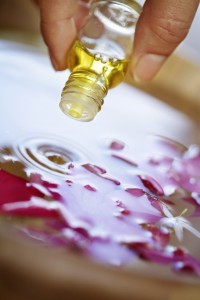
 At the workshop I presented at Gilda’s Club NYC in October (thank you to everyone who came!), I had several participants ask me about essential oils. Are some of them hormone disruptors? Does that mean we shouldn’t use products with essential oils in them?
At the workshop I presented at Gilda’s Club NYC in October (thank you to everyone who came!), I had several participants ask me about essential oils. Are some of them hormone disruptors? Does that mean we shouldn’t use products with essential oils in them?
First, let me put your mind at ease. In most products such as shampoos, lotions, and candles, the amount of essential oils is rarely higher than 1-2 percent of the total formula-just enough to add a nice, natural scent. At this amount, whether the oil is a hormone disruptor or not, chances are extremely slim that it will affect you, and certainly no studies have linked essential oils at this amount or any other to encourage cancer growth.
Second, essential oils are still much preferred over synthetic fragrances. Remember that synthetic fragrance can contain 200 chemicals or more, and there’s no way to know what those chemicals are because they are protected as trade secret. Essential oils, on the other hand, are listed right on the label, so you know exactly what you’re getting. And a little lavender, for instance, is much safer than a little of 200 or more unknown chemicals.
Third, are certain oils really hormone disruptors? If so, which ones?
The oils currently on the hormone-disruptor radar are lavender and tea tree, mainly because of one isolated study conducted in 2007. In that study, it was reported that certain products containing lavender and tea tree were linked with breast tissue growth in boys prior to puberty. This study was very small, however-only three boys-and was uncontrolled, so it was not totally clear as to whether or not it was truly the oils that caused the growth. In other words, the test didn’t evaluate the boys’ exposure to any other potential hormone-disrupting chemicals.
Laboratory studies confirmed some hormonal effects from these two oils, but these effects were very weak, and the researchers cautioned that more research is needed.
Another thing to consider-whether or not a chemical, oil or any substance has an effect on the body depends on the dose. Adults weigh more than children, and therefore require a higher dose of anything, including essential oils, to experience an effect. The amount of essential oils in most products, including even massage oil blends, is generally about a one-to-five percent dilution, and then you have other factors that affect absorption, including temperature, skin condition, and the other ingredients in the oil or cream or lotion.
What about inhaling these oils through the use of diffusers or candles, or in essence, what we refer to as aromatherapy? First, remember that other potentially dangerous ingredients in candles, such as petroleum products or lead wicks, are much more of a concern than essential oils. (Read our post for more.) Second, the vast majority of studies dealing with aromatherapy talk about its health benefits-some oils are even used in complementary medicine during cancer treatments. However, you have to be careful which ones you use. (Read our post for more.) Inhalation does have the potential to affect the body’s systems. The University of Maryland Medical Center, for example, talks about lavender’s ability to calm and soothe, but caution that though there are no known scientific reports of interactions, it may be wise to avoid lavender in combination with anti-depressants. So far, however, though I saw hundreds of studies on the benefits of lavender and tea tree, from relieving pain to improving sleep, I could not find any studies linking inhaled lavender or tea tree to hormone disruption.
Yet another thing: Unlike synthetic chemicals, which have been used only for decades, essential oils and herbs have stood the test of time, having been used in medicine and cosmetics for thousands of years. Their beneficial effects are recorded throughout history, and unlike many other chemicals used in today’s cosmetic products, they have not been linked to environmental damage, cancer, or reproductive problems.
My recommendation for now: Unless and until further studies show cause for concern, we just don’t have enough information to warrant undue caution where essential oils are concerned. If you’re going through treatment for a hormone-driven cancer, like certain types of breast, prostate, endometrial, or uterine cancer, you may feel better avoiding the direct application or inhalation of the following essential oils.
- Jasmine, geranium, and peppermint
- Rosemary, thyme, and lavender
- Clary sage, tea tree oil, and aniseed
- Citronella, eucalyptus, fennel, and verbena
One more warning-some essential oils are irritating to the skin, especially when your skin is compromised or fragile, like it is during cancer treatments. In these instances, you may want to avoid bergamot, lemongrass, melissa, peppermint, thyme, and verbena.
What do you think of the essential oil question? Please share your thoughts.
Photo courtesy shutterstock.com.

